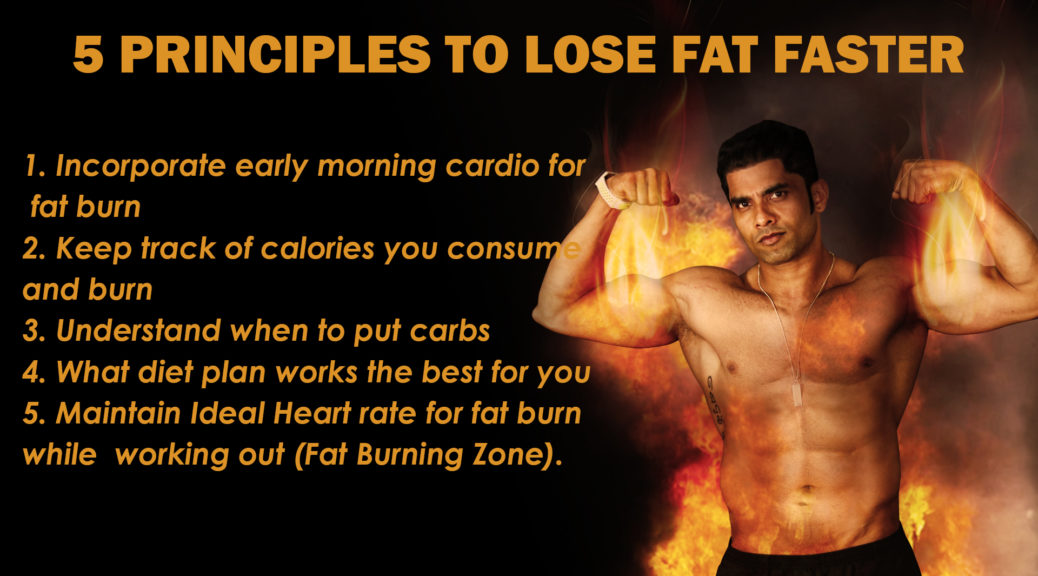
Five Principles to Lose Fat Faster
There are lots of articles on how to lose fats and manage your weight, at times it might be confusing and overwhelming. Let me break it down for you to 5 simple principles which will help you keep in shape, whether you are looking for a drastic weight loss plan or just trying to keep yourself fit.
1. Incorporate early morning cardio for fat burn:
Studies show steady state fasted cardio might burn more fats during your workout.
Some research does actually show that when you do cardio fasted in the morning, you burn up to 20 percent more fat.
Your body is in a fasted state when you have not eaten for at least 8 hours. A good night’s sleep is a sufficient amount of time to get your body into a fasted state. When insulin levels are low because you haven’t eaten, your body has no choice but to burn fat. Naturally, this happens faster when you haven’t eaten for 8 hour.
2. Keep track of calories you consume and burn:
The amount of calorie intake needed to lose fat for each individual depends on the type of workout you are doing, your body weight and your gender.
Average woman needs to eat about 2,000 calories per day to maintain her weight and the average man needs 2,500 calories a day to maintain his weight.
You should be 1100 calories deficit per day to lose 1 kg per week. which means cutting 7700 calorie each week.
Because 7700 calories equals about 1 Kg of fat, it’s estimated that you need to burn about 7700 calories to lose 1 Kg. So, in general, if you cut about 500 to 1,100 calories a day from your typical diet, you’d lose about 0.5 – 1 Kg a week.
3. Understand when to put carbs:
Although cutting carbs may be helpful, you CANNOT cut carbs too low for extended periods of time without doing more harm than good to your metabolism. By eating carbs at the right times, you guarantee that when you do eat them, they’re utilized optimally, and not shuttled straight to your cells and stored as body fat.
Morning:
When you eat carbs first thing in the morning, your body uses these carbs to replenish what you lost overnight, rather than storing them as fat.
Pre-workout:
Consume your carbs about an hour before your workout. Because carbs are so critical to providing energy, consuming carbs before your workout is a must, as the more energy you have, the harder you train.
Post-workout:
The reason why you need carbs after your workout is similar to the reason you’re taking them in first thing in the A.M. Those glycogen stores are used up when you train hard, and in order for you to replenish and allow your body to shuttle nutrients, you need carbs in your post-workout meal.
4. What diet plan works the best for you:
There are a lot of diet plans that you can choose viz.; Keto diet, intermittent fasting, etc. which are all proven diet plans that will help you achieve your goal.
In general, apart from following a strict diet plans:
Cut back on sugars and carbs:
That way instead of burning carbs for energy, your body starts feeding off of stored fat.
Eat Protein, Fat and Vegetables:
High-protein diets can also reduce cravings and obsessive thoughts about food by 60%. That means you automatically eat fewer calories.Don’t be afraid of eating fat, as trying to do both low-carb and low-fat at the same time is a recipe for failure.
Drink coffee or tea:
If you’re a coffee or tea drinker, then drink as much as you want as the caffeine can boost your metabolism by 3–11%
Get a good night’s sleep, every night:
Poor sleep is one of the strongest risk factors for weight gain, so taking care of your sleep is important.
5. Maintain Ideal Heart rate for fat burn while working out (Fat Burning Zone):
There is a perfect heart rate zone tailored to each individual that burns the most fat calories. Stay below this zone and you aren’t maximizing the fat burn. Go above this zone and you’re only burning the food in your stomach, not getting rid of the body fat.
You would need a heart rate monitor for this one to keep track of your heart rate especially while you’re doing your cardio.
Fat burning zone is at about 60-70% of your maximum heart rate.
Maximum heart rate (MHR)= 220 – Your Age (Male)
or = 226 – Your Age (Female)
For example, take a 35-year-old guy
Which means Maximum Heart Rate (MHR) of the person = 220-35 =185
Now 70% of 185 = 130 beats per minute, which is the ideal fat burn zone.
Typically, athletes train at about 90% MHR, but for fat burn you want to stay in this zone i.e. 60-70%.
